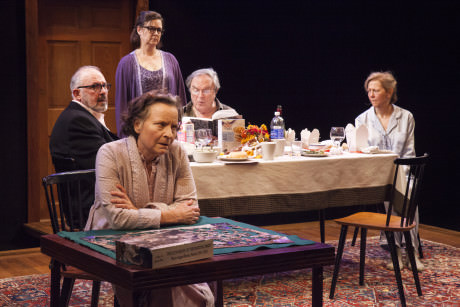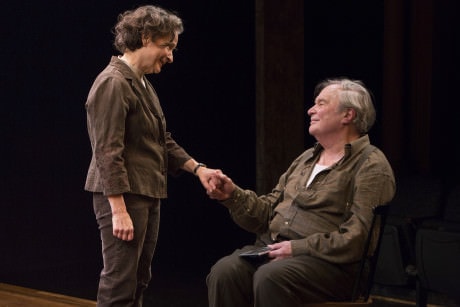You know that feeling you get when you go to something—you attend it as a visitor or you drop in as an interloper—and by the time that something ends, you feel as if you belonged to it? Well, there’s a family whose surname is Apple whose home has exactly that welcoming effect.

In November two years ago, The Studio Theatre presented the first two of Richard Nelson’s four-play Apple Family Cycle—That Hopey Changey Thing and Sweet and Sad. I remembered going to see them both and loving them—but I had quite forgotten what it was about them that I loved and why.
It is now another November, and The Studio Theatre has staged the last two Apple Family plays, Sorry and Regular Singing, with the same marvelous cast as before, under the same brilliant direction of Serge Seiden, set in the exact same dining room, designed by Deb Booth, in a stately house in upstate New York. And as soon as Sorry began, I realized that each of the people on stage was familiar to me, someone I once knew well, someone I had warmed to, someone whose company I had enjoyed. And gradually it all came back to me: the roseate glow I felt two years ago in the presence of this fascinating family as their private and unexceptional lives played out: their stories and opinions, their joys and sorrows, their tiffs and resentments, their bonds and affections
If The Apple Family Cycle were a reality show on TV, I would be hooked. I would schedule my life around it so as not to miss a single episode. Or if it were a serial dramedy on Netflix, I would be binge-watching. It’s that addictive. (But be assured, one need not have seen the first two installments to immerse oneself in the third. Sorry stands self-sufficiently on its own, and any backstory one might need to know is artfully told within it.)
Although Sorry has very loosely an overarching narrative, it is actually a medley of stories. As in many a family, everyone brings their own dramas and quirks, like individual portion-size covered dishes, which as cooked up by Playwright Nelson turn into a terrific plotluck.
The Apple family members have gathered—by happenstance on the 50th anniversary of the assassination of JFK—because the time has come to move Benjamin, the eldest, into a nearby assisted-living home.
Benjamin is in his eighties and was once a renowned actor. Ted van Griethuysen’s regal bearing in the role leaves no doubt his performances used to be grand. But Benjamin suffers long – and short-term memory loss—which van Griethuysen portrays with a charming addledness—and his condition has worsened past what the two women in his family who care for him can manage.
Benjamin lives with two nieces, Barbara and her sister Marian. Barbara, the eldest, is single and a school teacher. Sarah Marshall completely captures the brittleness in Barbara’s manner that masks a lonely vulnerability. Marian is divorced and dating, and mother of a daughter who years ago committed suicide. Elizabeth Pierotti’s performance reveals Marian in all her complexity—her girlish excitement about her new boyfriend, her undertow of grief from her loss. Their sister, Jane, has come from Chicago to support them through the difficult transition they must undertake for the sake of their uncle and themselves. Jane is the youngest and liveliest and has a boyfriend who’s a struggling actor. The detailed way Kimberly Schraf conveys Jane’s no-nonsense amiability rounds out the enduring sisterhood the three women share.
Their brother, Richard, a high-powered lawyer, has also arrived but is impatient to leave. As the son he was favored, which to this day rankles his sisters. Yet even as they chide him for his overbearing sense of entitlement, they know as siblings they are inextricably bound. In revealing what is both annoying and winning about Richard, Rich Foucheux’s precise portrayal of the character is captivating.
The show’s several scenes are separated by lowered lights (lighting design by Daniel MacLean Wagner) and chimes (sound design by Palmer Heffernan), during which the actors rearrange themselves slightly. It is as if the play proceeds in real time but now and then hits pause. Sorry begins at 5 a.m. with all the characters still in sleepwear—except Richard, who shows up unexpectedly early—and one by one we see them dress for the day (in costumes designed to suit each character beautifully by Helen Huang).
Mainly what happens in Sorry is a lot of smart chat, including about politics and curious info—fun facts we didn’t know and matters of import in the larger scheme of things. Unlike typical domestic dramas that stay confined within some self-referential zone, Sorry foregrounds a family who are all avid readers, eager absorbers of ideas, and alert observers of current affairs. Near the end they play a kind of game: They go around the room telling what they would say to President Obama. And no sooner does this game begin but what one wants to play along in one’s own mind too.

Studio Theatre’s production of Sorry has the most refreshing and enticing effect: It not only invites us by the heart into a family’s shared mealtimes and memories; it engages our intelligence like a scintillating conversation.
You can come as you are. The family in The Studio Theatre’s Sorry has set out a wide welcome mat. And once you enter their home you’ll cross a threshold to a remarkable work of theater that in showing us the warm interior of a family bears witty witness to the wider world we live in.
And who would not jump at the chance to be a guest at that?
Running Time: About one hour 45 minutes, with no intermission.
The Apple Family Cycle: Sorry plays in repertory with The Apple Family Cycle: Regular Singing through December 13, 2015, at The Studio Theatre’s Milton Theatre, 1501 14th Street NW, Washington, DC. Tickets are available at the box office, 202-332-3300, and online.
LINK:
‘Regular Singing’ in Repertory with ‘Sorry’ at Studio Theatre reviewed by Robert Michael Oliver on DCMetroTheaterArts.
________
Note: The Studio Theatre’s 2013 productions of the first two plays in Richard Nelson’s cycle—That Hopey Changey Thing and Sweet and Sad—are in the Washington Area Performing Arts Video Archive (WPAVA) and may be viewed for free at the Clarice Smith Performing Arts Center, University of Maryland, College Park, MD, and the Martin Luther King D.C. Public Library, Washington, DC.
_______






This is a wonderful review! I can’t wait to see both plays!